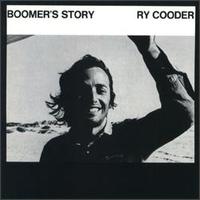Boomer's Story
| Boomer's Story | ||||
|---|---|---|---|---|
 | ||||
| Studio album by | ||||
| Released | November 1972 | |||
| Studio | Amigo Studios, North Hollywood; Ardent Studios, Memphis; Muscle Shoals Sound Studios, Muscle Shoals; Quadrafonic Sound Studios, Nashville | |||
| Genre | Roots rock, blues, folk, Americana | |||
| Length | 39:07 | |||
| Label | Reprise | |||
| Producer | Jim Dickinson, Lenny Waronker | |||
| Ry Cooder chronology | ||||
| ||||
| Review scores | |
|---|---|
| Source | Rating |
| Allmusic | |
| Christgau's Record Guide | B[1] |
Boomer's Story is the third studio album by American roots rock musician Ry Cooder, released in 1972.
Track listing
[edit]Side one
[edit]- "Boomer's Story" (listed as "Traditional," actually Carson Robison) – 4:13
- "Cherry Ball Blues" (instrumental) (Skip James) – 4:10
- "Crow Black Chicken" (Lawrence Wilson) – 2:14
- "Ax Sweet Mama" (Sleepy John Estes) – 4:23
- "Maria Elena" (instrumental) (Bob Russell, Lorenzo Barcelata) – 4:30
Side two
[edit]- "The Dark End of the Street" (instrumental) (Dan Penn, Chips Moman) – 3:25
- "Rally 'Round the Flag" (George F. Root) – 3:34
- "Comin' In on a Wing and a Prayer" (Jimmy McHugh, Harold Adamson) – 3:00
- "President Kennedy" (Sleepy John Estes) – 4:39
- "Good Morning Mr. Railroad Man" (Traditional) – 4:30
Notes
[edit]The title track was previously recorded as "The Railroad Boomer"[2] by Bud Billings (aka Frank Luther) and Carson Robison in a performance recorded at the studio at Liederkranz Hall in New York on September 9, 1929 (Victor V-40139).[3][4] Although it is credited on Cooder's album as "traditional," Robison was awarded a copyright and the song "can't be shown to have circulated in oral tradition."[5] Gene Autry recorded it in December of the same year.[6] In the 1930s the song was recorded for Decca Records by the Rice Brothers' Gang,[7][8] in 1939 by Roy Acuff & His Smoky Mountain Boys, in 1941 by Riley Puckett for RCA, and in the 1950s by Cisco Houston (as "The Rambler") and by the New Lost City Ramblers, who included Cooder's guitar teacher Tom Paley.
Personnel
[edit]- Ry Cooder - guitars, mandolin, bottleneck guitar, vocals
- Tommy McClure - bass
- Charles Lawing - clarinet
- Jim Keltner, Roger Hawkins - drums
- Sleepy John Estes - guitar and vocals on "President Kennedy" (recorded in Collierville, Tennessee)
- Gene Finney - harmonica
- George Bohanon - horns
- Milt Holland - percussion
- Randy Newman - piano on "Rally 'Round the Flag"
- Jim Dickinson - piano, bass, backing vocals
- Dan Penn - backing vocals
- Technical
- Judy Maizel - production assistant
- Jerry Masters, John Fry, Lee Herschberg, Richard Rosebrough - engineer
- Susan Titelman - photography
Notes
[edit]- ^ Christgau, Robert (1981). "Consumer Guide '70s: C". Christgau's Record Guide: Rock Albums of the Seventies. Ticknor & Fields. ISBN 089919026X. Retrieved February 23, 2019 – via robertchristgau.com.
- ^ Long Steel Rail: The Railroad in American Folksong (2d ed.) by Norm Cohen. University of Illinois Press; 2 Sub edition. 2000. ISBN 0252068815 pgs 290-291 [1]
- ^ Encyclopedic Discography of Victor Recordings [2]
- ^ Audio for Bud Billings and Carson Robison[3]
- ^ "The Railroad Boomer - Folklorist". www.folklorist.org. Retrieved 14 February 2019.
- ^ Public Cowboy No. 1: The Life and Times of Gene Autry by Holly George-Warren. Oxford University Press: 2007. ISBN 0195177460[4]
- ^ sergiofu42 (12 April 2012). "RILEY PUCKETT Railroad Boomer". Archived from the original on 2021-12-21. Retrieved 14 February 2019 – via YouTube.
{{cite web}}: CS1 maint: numeric names: authors list (link) - ^ Mark n Victoria Macham (4 February 2011). "Rice Brothers' Gang performs Railroad Boomer written by Carson Robison & Frank Luther". Archived from the original on 2021-12-21. Retrieved 14 February 2019 – via YouTube.
